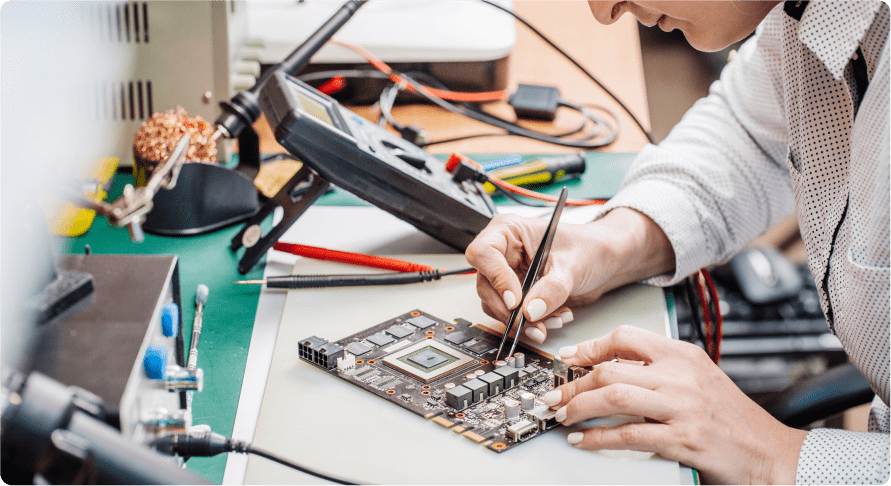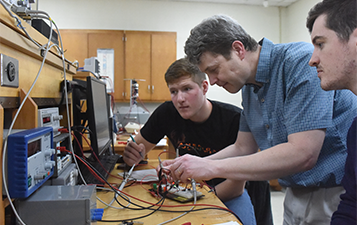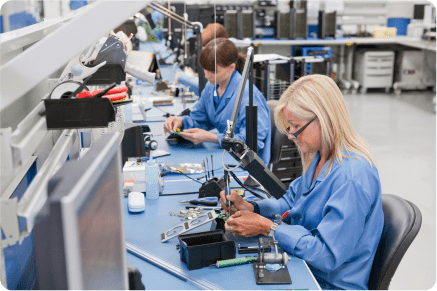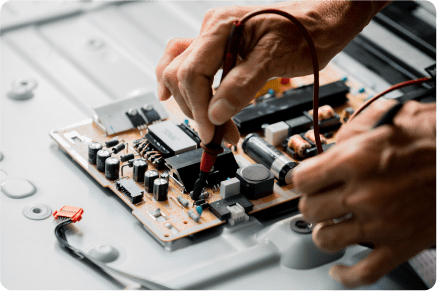
Great Career Opportunities Multiple Job Offers
Classes and Labs Taught by Professors (Not by Teaching Assistants)
State-of-the-Art Industrial Robotics Laboratory
The electrical engineering program combines topics from science, math and engineering in order to study topics that will enable you to develop electrical and electronic solutions to meet human needs. The program contains a strong laboratory emphasis with plenty of opportunities to work on real electrical systems.
Since a typical LSSU engineering class has about 15 students, you will have the chance to work closely with your instructors, not graduate students, all of whom are full-time teaching faculty members. The small class size also promotes interaction in the lecture and the laboratory with other students and with your instructor.

Recognizing that learning comes through doing as well as listening, all LSSU engineering programs are designed to include a significant amount of engineering practice along the way. The core of electrical engineering curriculum contains 18 engineering courses of which 13 contain a laboratory component. Additionally, most technical elective courses contain laboratory components. Many of these laboratory activities include a capstone project. This means that you will have ample opportunity to learn through experience.
While the emphasis in the electrical engineering curriculum is to provide a solid background in all related areas, it does contain electro-mechanical systems and control systems, two courses not typically found in other university cores courses. Both of these courses are important in providing understand for other areas like robotics, electric vehicles, and automation. Additionally, the electrical engineering curriculum has three concentrations that allow students to tailor their study. These include Digital Systems and Robotics.
LSSU Electrical Engineering Graduate Kenneth Casperson comments on how his education prepared him for his job in the electrical power distribution industry
All LSSU engineering students participate in a senior project. Our senior projects span two semesters during the senior year and are usually sponsored by an industrial customer. A typical senior project team is comprised of four or five students having various engineering and engineering technology majors. The team works directly with their customer to complete the project. Skills such as leadership, team work, financial budgeting, project management, technical writing, presentations, and design reviews are just among the many soft skills that are honed through this experience. It truly prepares student for the future in both industry and academia.
A minor in Electrical Engineering is available for non-engineering students.
Concentrations are available in the following areas:

LSSU engineering alumni are successful and engaged in meaningful careers in both Michigan and internationally. Recent graduates of the electrical engineering program have worked for Tenaris Algoma Tubes, Essar Steel, Pretec, Dematic, Patti Engineering, Exel North America, and Brock Solutions. Others have gone on pursue graduate degrees at institutions such as Michigan State University, Purdue, University of Michigan, University of Dunquerke (France), Michigan Technological University, and Oregon State University.

The path to becoming an electrical engineer is challenging but very rewarding. It involves completing a four-year curriculum that is filled with challenging classes in mathematics, the physical sciences, and, of course, engineering. At LSSU we strive to equip our students and to provide a learning environment that maximizes success in both their studies and future careers.

The School of Engineering & Technology’s Electrical Engineering bachelor’s degree program is accredited by the Engineering Accreditation Commission of ABET, http://www.abet.org, under the commission’s General Criteria and Program Criteria for Electrical Engineering.
Digital Systems Concentration – For those that choose Electrical Engineering as a major but still have a strong interest in digital and embedded systems, LSSU provides the Digital Systems Concentration.
Potential Jobs
Courses
This concentration consists of the following courses:
Technical Areas
Industries

